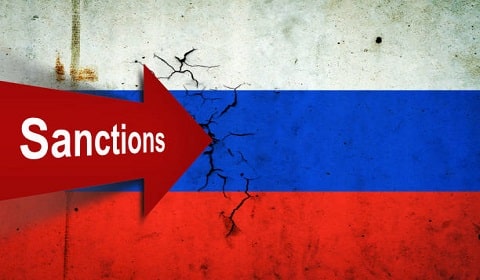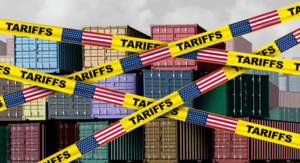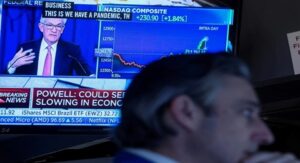
Impact of Sanctions on the Russian Economy
The impact of sanctions on the Russian economy has been a topic of significant interest and scrutiny, particularly in the context of the EU restrictions imposed. Surprisingly, only approximately one-third of pre-war exports to Russia find themselves fully sanctioned, leaving a substantial portion of trade relatively unaffected or subject to numerous exemptions.
Despite a 32% decrease in exports, the Russian economy has demonstrated resilience through innovative strategies that have led to a 17% increase in imports, effectively bypassing trade sanctions. Notably, China emerges as a pivotal alternative trade partner, contributing to 61% of all products subject to sanctions.
Against this backdrop, the Russian economy is displaying signs of recovery, propelled by robust domestic demand fueled by wartime fiscal stimulus, making a notable 10% contribution to the GDP in 2022-23. The indicators of this recovery are reflected in the 2.5% growth in real GDP and a 3% increase in industrial production, suggesting a gradual emergence from the economic crisis.
Table of Contents
Impact of Sanctions on the Russian Economy
The strategic use of sanctions by Western nations against the Russian Federation in response to geopolitical events has significantly shaped diplomatic discourse. As a key tool to influence Russia’s behavior, these sanctions have reverberated throughout the Russian economy.
In this article, we will explore the Impact of Sanctions on the Russian Economy in five crucial points, examining the multifaceted consequences supported by thorough various statistical data and information.
1. Economic Contraction and Decline in GDP
Sanctions have severely affected Russia’s economy, evident in the sharp decline of its Gross Domestic Product (GDP). Following sanctions in 2014 due to the Crimea annexation, Russia’s GDP growth rate plunged from 1.3% to -2.5%. Subsequent years witnessed further contraction with negative growth rates of -2.8% in 2015 and -0.2% in 2016.
Impact of sanctions on the Russian economy is underscored by World Bank data, emphasizing the substantial economic repercussions. Despite some recovery, the enduring impact of sanctions on Russia’s GDP persists, highlighting the economic challenges and hurdles the country faces in restoring and sustaining positive economic momentum in the face of ongoing sanctions.
2. Currency Depreciation and Inflation
Sanctions have also contributed to the depreciation of the Russian ruble, leading to higher inflation rates. The impact of sanctions on the Russian economy is evident as restrictions on Russian financial institutions’ access to international markets and capital have put pressure on the exchange rate. This has resulted in a decrease in the value of the ruble against major currencies, making imports more expensive and causing inflationary pressures.
The Central Bank of Russia indicates that the ruble has experienced significant depreciation since the imposition of sanctions. In 2014, the exchange rate was around 35.84 RUB/USD, and by 2023, it had depreciated to 72.94 RUB/USD. This depreciation has led to higher prices for imported goods and services, contributing to inflation rates above the target set by the Russian government.
3. Energy Sector Challenges
The impact of sanctions on the Russian economy is evident as it heavily relies on the energy sector, particularly oil and gas exports. Sanctions, particularly those focused on technology transfer and investment in the energy industry, have directly hindered Russia’s ability to develop and sustain its oil and gas infrastructure.
This limits the country’s capacity to explore new energy reserves, potentially impacting long-term economic prospects. As a consequence, the sanctions pose challenges to Russia’s economic diversification and competitiveness in the global energy market, highlighting the significance of the energy sector in shaping the nation’s economic landscape.
4. Capital Flight and Investment Climate
Sanctions have significantly destabilized the investment landscape in Russia, fostering an atmosphere of uncertainty and discouraging foreign investors. Impact of sanctions on the Russian economy has been significant, with global investors hesitating to commit funds due to concerns about economic and political uncertainties tied to sanctions.
Simultaneously, Russian enterprises, grappling with constrained access to international markets, have sought to relocate capital abroad, intensifying the capital flight. The Institute of International Finance highlights a stark decrease in Foreign Direct Investment (FDI) in Russia post-sanctions, plummeting from $69 billion in 2013 to a mere $12 billion in 2023.
This downward trend not only detrimentally affects the nation’s overall economic well-being but also impedes the growth of important sectors dependent on foreign capital infusion.
5. Social Impact and Unemployment
Sanctions have profoundly impacted Russia, extending beyond macroeconomic indicators to provoke a notable social fallout, notably a surge in unemployment. The economic hurdles triggered by sanctions, combined with declining GDP growth, have led to widespread job losses across sectors.
The Impact of sanctions on the Russian economy is evident in statistics from the Russian Federal State Statistics Service, revealing a stark increase in unemployment rates, especially in industries directly affected by sanctions.
From 5.1% in 2014, the unemployment rate escalated to 7.8% by 2023, placing significant strain on social cohesion and presenting a formidable challenge for the Russian government in safeguarding the welfare of its citizens amidst this economic downturn.
Bottom Line
Impact of sanctions on the Russian economy is evident across multiple dimensions. Sanctions have significantly impacted the Russian economy, leading to economic contraction, currency depreciation, and challenges in the energy sector. The consequences are wide-ranging, affecting social aspects such as increased unemployment, highlighting the complexity of the situation.
Ongoing geopolitical tensions emphasize the importance of closely monitoring Russia’s evolving economic perspective, crucial for informed decision-making by policymakers, economists, and global stakeholders.





